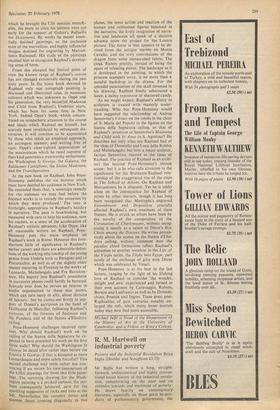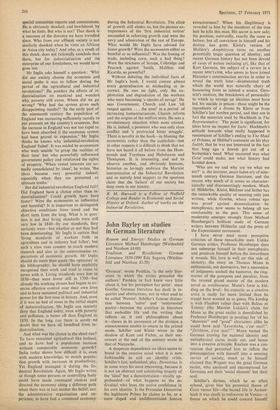R. M. Hartwell on industrial poverty
Mr Inglis has written a long, straight- forward, undocumented and highly conven- tional social history of the industrial revolu- tion, concentrating on the poor and on attitudes towards and treatment of poverty. He draws heavily on contemporary literature, especially on those great by-pro- ducts of parliamentary government, the
special committee reports and commissions. He is obviously shocked, and bewildered, by what he finds. But who is not? That shock is a measure of the distance we have travelled since. Who from our affluent society is not similarly shocked when he visits an African or Asian city today? And who, as a result of this shock, does not rationally conclude that there, but for industrialisation and the enterprise of our forefathers, we would have gone too. Mr Inglis asks himself a question: 'Why did our society choose the economic and social paths it was to follow during the period of the agricultural and industrial revolutions?' He ponders the effects of in- dustrialisation on mankind and wonders why, poverty still exists. Where did we go wrong? 'Why had the system given such disappointing results?' In the early part of the nineteenth century the population of England was increasing sufficiently rapidly to put pressure on the country's resources. But the increase in England was not too rapid to have been absorbed if the economic system had been geared to expansion.' Mr Inglis thinks he knows why industrial-revolution England 'failed'. It was misled by economists who were unable `to grasp the realities of their time' but who powerfully influenced government policy and reinforced the rights of property. 'When vested interests are ac- tually consolidated by ideas', he writes, 'the ideas become very powerful indeed; especially when they are presented as ultimate truths.'
But did industrial-revolution England fail? Did England have a choice other than in- dustrialisation? Could growth have been faster? Were the economists so influential and harmful? It is important to distinguish objective conditions from trend and the short term from the long. What is in ques- tion is not that living standards were still very low in 1840—by our standards, they certainly were--but whether or not they had been deteriorating. Mr Inglis is certain that 'living standards of workers both in agriculture and in industry had fallen', but such a view runs counter to much modern research and also to the commonsense ex- pectations of economic growth. Mr Inglis should do more than quote 'the optimists' in his bibliography; he should have explicitly recognised their work and tried to come to terms with it. Living standards were low in 1850—they were lower still in 1700—but already the working classes had begun to ex- ercise effective control over their own lives and to have sustained political and industrial power for the first time in history. And, even if it was no bed of roses in the initial stages of industrialisation, Mr Inglis can scarcely deny that England today, even with poverty and pollution, is better off than England in 1850. In the long run there is surely no doubt that we have all benefited from in- dustrialisation.
And what was the choice in the short run? To have remained agricultural like Ireland, and to have had a population increase without comparable economic growth? India today shows how difficult it is, even with modern knowledge, to match popula- tion growth with increases in productivity. Yet England managed it during the In- dustrial Revolution. Again, Mr Inglis writes as though some persons or controlling body could have made command choices and directed the economy along a different path when there was in fact neither the belief, nor the administrative organisation and ex- perience, to have had a command economy during the Industrial Revolution. The elixir of growth still eludes us, but the pioneer en- trepreneurs of the 'first industrial nation' succeeded in achieving growth and were the envy and admiration of the rest of Europe. What would Mr Inglis have advised for faster growth? Were the economists either so baneful or so influential? Was the freeing of trade, including corn, such a bad thing? Were the strictures of Scrope, Coleridge and Peacock against Smith, Malthus and Ricardo, so powerful?
Without debating the individual facts of Mr Inglis's book, I would contest almost every generalisation as misleading or in- correct. He sees no light, only the ex- ploitation and degradation of the workers who were becoming 'a species of savage'. He sees Government, Church and Law 'all ranged against . . . the poor' in a period of increasing humanitarianism, Church reform and the origins of the welfare state. He sees a revolutionary situation when none existed. He is, indeed, a pessimist who sees only class conflict and 'a protracted bitter struggle'. There is novelty in the book—in blaming the economists rather than the capitalists—but in other respects it is difficult to think that we have not heard it all before from the Ham- monds and Toynbees and Hobsbawm and Thompson. It is interesting and sad to observe another, and obviously humane, historian so lovingly embrace the Marxist interpretation of the Industrial Revolution and so naively lend support to the spurious claim that the 'failure' of our society has deep roots in our history.
R. M. Hartwell is a Fellow of Nuffield College and Reader in Economic and Social History at Oxford. Author of works on the Industrial Revolution.



































 Previous page
Previous page